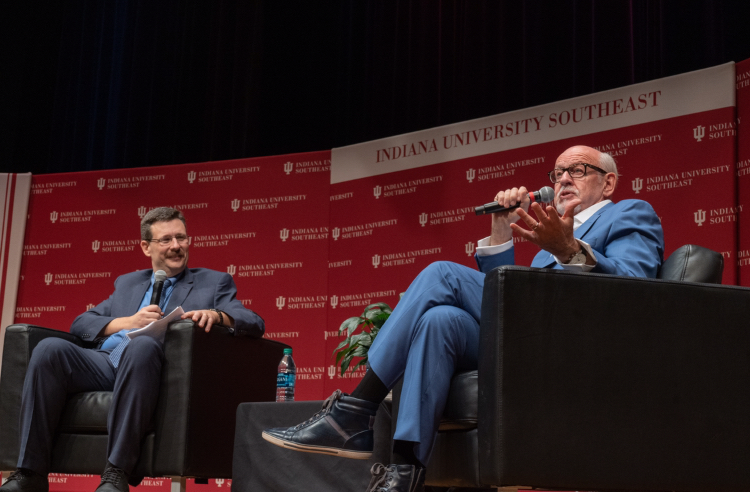Frank Oz – the character, not the voice
Frank Oz discusses his life as a puppeteer, director and human being during his visit to the Ogle Center at IU Southeast.
“Just because I’m here and now you think I do all these voices, it doesn’t mean it comes easy. It also doesn’t mean that just because you guys can’t do something now doesn’t mean you can’t do something later,” Oz said.
March 20, 2019
On Tuesday, March 19, Frank Oz spoke to a packed house about his career with The Muppets and Sesame Street, as well as his days as a director and experiences working with Jim Henson and George Lucas.
“First of all, I’m not a voice person. I don’t even think of the voices. I do the characters,” Oz said during his Sander’s Speakers session in the Ogle Center of IU Southeast.
Dr. David Eplion, dean of the school of business, sat down with Oz to question him on his different experiences. The audience also submitted questions to be asked toward the end of the night.
Near the beginning of the session, Oz was asked by Epilon if Sesame Street was meant to be a children’s show.
“Sesame Street was always written at two levels. The intent was for it not to be a babysitter, but [Joan Ganz Cooney] intended it to be with the parents so the kids and the parents are both watching it,” Oz said.
The primary characters Oz played on Sesame Street include Grover, Cookie Monster, Bert and many others. The characters haven’t been played by Oz for 10 years. He made sure to note that he will not do the voices of any of his characters outside of work because it takes away their authenticity.
“I don’t do [the voices] because they mean a lot to me. I have to keep them pure. If the characters aren’t pure, they’re not going to connect with you,” Oz said.
He recalled his time working with the Muppets, from the early years of learning how to work the puppets through small commercial gigs, to performing along with the original cast of Saturday Night Live and finally starting their own show in the mid seventies.
Epilon asked Oz about the many backstories he creates for each character he invites into his head. Oz’s response was that he needs to have a full backstory on each character to do good work. If he does not know what is happening inside the character, then the character becomes superficial.
“I do a backstory on Yoda and whoever else because you don’t have to know it. You don’t know it and you’ll never know it,” Oz said.
Later, Oz reflected on his experiences as a director. His directing debut was alongside veteran filmmaker and lifelong friend Jim Henson for the film “The Dark Crystal.” He then continued to direct films such as the musical “Little Shop of Horrors,” the heist movie “The Score,” and the comedy “What about Bob?” He spoke about what he learned over the years from his films.
“My job as a director is to get the very best work… I learned a tremendous lesson not only in business or in life but that people are scared and they act oddly for a reason,” Oz said. “It’s my job to nurture my actors no matter what they say about me.”
Henson recommended Oz for the part of Yoda in 1979 when George Lucas called asking for someone to take the role. Epilon asked Oz of his impression of Lucas after deciding to be part of the Star Wars universe.
“He’s very much like Jim. They’re both very quiet, very smart, very hard working,” Oz said. “George is a filmmaker and Jim was really an artist. He started off as production design, so they have different values but in general George didn’t tell me what to do just like Jim. He wanted the other person to try and grow.”
The session concluded with a standing ovation by the sold-out audience.
Dylan Grant, political science junior at IU Southeast, said he enjoyed what he got out of the night.
“His whole purpose of promoting creativity was great and just how he was able to flourish in his roles, especially with Jim Henson,” Grant said.
A member of the community, Kayla Crone, also enjoyed the evening.
“I learned a lot about what’s important in leadership, just being authentic,” Crone said. “Keeping things pure and just really fostering a desire in my workmanship,” Crone said.
Oz left the Ogle Center asking to close the night off with his last piece of advice.
“The best thing I can say is do what excites you,” Oz said. “When I was a kid, I would be in the audience like you guys looking at someone like me who is a success and I would be thinking, ‘Man, I could never do that.’ Just understand that actually, you guys are good enough. Okay? You can do what you want to do, really. That’s all.”


